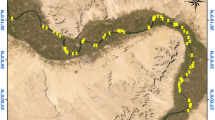Abstract
IN two recent publications1,2 measurements have been reported of the levels of lead-210 (radium-D) in the bones of non-occupationally exposed American subjects. In the present communication similar findings are reported for some human and animal bone and liver specimens from Great Britain.
This is a preview of subscription content, access via your institution
Access options
Subscribe to this journal
Receive 51 print issues and online access
$199.00 per year
only $3.90 per issue
Buy this article
- Purchase on Springer Link
- Instant access to full article PDF
Prices may be subject to local taxes which are calculated during checkout
Similar content being viewed by others
References
Hursh, J. B., Science, 132, 1666 (1960).
Holtzman, R. E., ANL-6199, 94 (1960).
Tipton, I. H., et al., see Recommendations ICRP, Rep. Comm., II, Table 7 (Pergamon Press, 1959).
Mayneord, W. V., Clin. Radiol., 11, 2 (1960).
Mayneord, W. V., and Hill, C. R., Nature, 184, 667 (1959).
Hill, C. R., Nature, 187, 211 (1960).
Author information
Authors and Affiliations
Rights and permissions
About this article
Cite this article
HILL, C., JAWOROWSKI, Z. Lead-210 in Some Human and Animal Tissues. Nature 190, 353–354 (1961). https://doi.org/10.1038/190353b0
Issue Date:
DOI: https://doi.org/10.1038/190353b0
This article is cited by
-
A bone ash standard for90Sr,210Pb,210Po, uranium and the actinides
Journal of Radioanalytical and Nuclear Chemistry Articles (1994)
-
Stable Lead in Fossil Ice and Bones
Nature (1968)
-
Temporal and Geographical Distribution of Radium D (Lead-210)
Nature (1966)
-
Natural Levels of Lead-210, Polonium-210 And Radium-226 in Humans and Biota of the Arctic
Nature (1966)
-
Lead-210 and Polonium-210 in Human Tissues
Nature (1963)
Comments
By submitting a comment you agree to abide by our Terms and Community Guidelines. If you find something abusive or that does not comply with our terms or guidelines please flag it as inappropriate.


